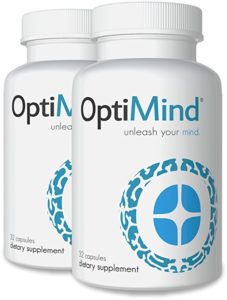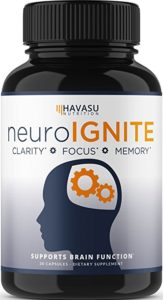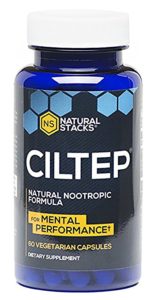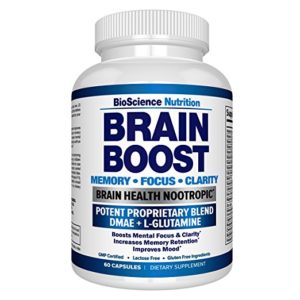
Many deep thinkers, CEOs and people of mastery are taking nootropics, commonly known as smart drugs, for increased brain function.
(This is your ability to learn, focus, remember things and solve complex problems)
From Joe Rogan to Tim Ferriss, smart drugs were being talked about years ago before recently hitting mainstream.
Nootropics work, but you got to be careful.
Since nootropics are such a hot topic right now, it can be hard to separate whats legit and whats whack.
Our research team looked at the scientific research in-depth to find the best nootropics on the market right now.
1. OptiMind

Click here for the lowest price on Amazon
OptiMind provides the best balance among proven nootropic ingredients. It balances a moderate dose of vitamin D with a heavy dose of vitamin B12, and several key nootropic supplements, including L-tyrosine, bacopa extract, caffeine, ALA, and vinpocetine, to name just a few. The dosages are on-point and there aren’t any extraneous ingredients, making OptiMind come out number one.
2. Alpha Brain

Click here for the lowest price on Amazon
The widely-known nootropic supplement from Onnit, made famous in part thanks to Joe Rogan’s ringing endorsement, fares well thanks to the strong results from a clinical trial conducted at the Boston Center for Memory and published in a peer-reviewed scientific journal in 2016 (1).
Alpha Brain’s blend of supplements seems particularly effective at boosting verbal skills, so it’s great if you need to read or write a lot.
3. NeuroIgnite

Click here for the lowest price on Amazon
NeuroIgnite contains high doses of several powerful nootropic supplements, and moreover, the label actually tells you how much of each extract is in the supplement, unlike other companies who hide the specifics of their blend under the veil of a “proprietary blend.”
The heavy hitters in this blend are bacopa monnieri, DMAE, and ginkgo biloba, all heavily-researched supplements with evidence for nootropic effects.
4. Neuro-Peak

Click here for the lowest price on Amazon
Zhou Nutrition’s Neuro-Peak is an immensely popular nootropic supplement that includes a massive dose of vitamin B12 and a slew of herbal extracts. Rhodiola rosea extract is one of the distinguishing factors in Neuro-Peak; this herbal extract appears to be effective at staving off mental fatigue.
Because of this, Neuro-Peak is a good choice if you’re faced with a long stretch of continuous, mentally challenging work to do.
5. Neuro Spark

Click here for the lowest price on Amazon
We Are Fit’s Neuro Spark goes heavy on the St. John’s wort and ginkgo biloba, but includes some of the newer nootropic supplements like vinpocetine, bacopa monnieri, and huperzine-A as well.
It’s a well-balanced, stimulant-free nootropic that’s well-suited for boosting your performance at any cognitively challenging task.
6. Ciltep

Click here for the lowest price on Amazon
Ciltep by Natural Stacks is a little unusual–it doesn’t follow the lead of the more popular nootropic supplements. It chooses to include unconventional nootropic compounds like artichoke extract and forskolin extract (better known for its use as a weight loss supplement).
As you might guess, there’s far less research on the cognitive enhancement properties of these supplements, but if normal nootropics aren’t doing it for you, Ciltep might be worth a shot.
7. TruBrain

Click here for the lowest price on Amazon
TruBrain focuses on delivering amino acids, plus the tried and true caffeine (only 100 mg per shot) and magnesium to achieve its nootropic effects. This approach is more about providing your brain with the natural building blocks it needs to function properly, versus trying to boost its function above its natural level. If you want more of a tune up than an upgrade, TruBrain is a good choice.
8. Clarity

Click here for the lowest price on Amazon
Neovicta’s Clarity supplement is firmly in the “kitchen sink” camp, which is to say that it includes just about everything that might affect cognitive function. It’s got vitamins, minerals, supplements, extracts, and synthetic compounds.
This betrays a lack of an overarching strategy when it comes to boosting cognitive function, but if you just want to cover your bases, it’s not a bad choice.
9. Brain Boost

Click here for the lowest price on Amazon
Brain Boost is essentially a multivitamin along with several herbal extracts that affect biological processes related to cognitive function. Its purpose to to make sure your body is fueled up with the right micronutrients and biological precursors to function at its best.
Unfortunately, because its nootropic ingredients are part of a “proprietary blend,” it’s impossible to see how much of each ingredient is present in the supplement.
10. NeuroFit

Click here for the lowest price on Amazon
NeuroFit is another nootropic that goes heavy on the vitamins and minerals, but is secretive about the amounts of the actual nootropic ingredients in its formulation. With so many ingredients, it seems unlikely that the active ingredients are present in high concentrations.
Nootropics benefits and side effects
Nootropics are supplements that are designed to boost cognitive function–that is, enhance your brain’s ability to learn, remember, and solve problems.
Though they are extremely popular among students, nootropics have a much broader appeal. Just about anybody in a complex job wants the ability to work faster and more effectively, and people who are getting older like the appeal of staving off brain fog and some of the cognitive decline that comes along with aging.
Benefits
When a supplement claims to impact cognitive function, it’s a fairly easy claim to test.
Unlike other supplements that claim to boost “well-being” or “promote a healthy immune system,” testing cognitive function is straightforward: you get a group of subjects, give them the supplement in question or a placebo, then subject them to a battery of psychometric tests to assess their cognitive function.
There are a variety of types of these kinds of tests, and different supplements seem to affect different aspects of cognitive function. Some seem to boost memory, while others influence verbal abilities or help reduce mental fatigue (the diminishing of cognitive performance after long, challenging efforts).
A good case study in how testing nootropics work can be observed in the 2016 study that validated the effects of Alpha Brain (2).
Researchers split a group of volunteers into two groups, one of which was given Alpha Brain, and the other of which was given a placebo supplement. Both groups were tested for their cognitive abilities at the outset of the study, then took their assigned supplement for six weeks before being tested again.
The psychometric battery of tests used in the study included visual, spatial, logical, and verbal reasoning and memory. The results showed no improvement in most metrics, but a statistically significant increase in verbal memory.
Other supplements have been studied on an individual level to identify potential nootropic benefits. As you might guess, the most popular ingredients among the top-ranked nootropic supplements are also among the best-studied and most effective.
Bacopa monnieri, for example, is an herbal extract that’s been demonstrated to have specific cognitive enhancing effects. A 2001 study in the scientific journal Psychopharmacology conducted a similar protocol to the Alpha Brain study–a group of healthy adult subjects were given a 300 mg dose of bacopa monnieri extract or a placebo for twelve weeks, and were subjected to a battery of cognitive tests before and after the supplementation period (3).
In this case, the researchers found that the bacopa supplement increased the speed of visual information processing, learning rate, and memory consolidation.
Ginkgo biloba and vinpocetine looks to be an effective supplement when it comes to speeding up your short-term working memory.
A study published in the journal Human Psychopharmacology used a similar placebo-controlled experiment to study the effects of a combination of ginkgo biloba and vinpocetine on cognitive function, and found that the supplement combination increased the speed at which your working memory functions after being taken for two weeks (4).
When looking at nootropic supplements, you’ll have to think specifically about what kind of cognitive enhancement you are looking for.
When working on a major writing project, or attempting to work through a lot of reading material, taking something like Alpha Brain that increases verbal memory is could be very helpful.
On the other hand, something that improves visual information processing and learning rate, like bacopa monnieri extract, would likely speed your ability to learn math flash cards or process on-screen visual information.
If you were doing data entry, you might want something to improve short-term working memory, like ginkgo biloba and vinpocetine.
It’s clear that taking the time to analyze the specific cognitive demands of the task in question will help immensely when you are deciding what the ideal nootropic supplement is for you.
Other nootropic supplements were studied initially to help with cognitive decline and dementia in the elderly, but have been hypothesized to be effective as well in healthy people.
One example of this is the herbal supplement huperzine-A. Early research found that it had a strong anti-dementia effect. A 1999 experiment described using a huperzine-A supplement to reverse natural dementia in elderly monkeys, as well as reversing chemically-induced cognitive decline in young monkeys (5).
Research into whether it can be used to actually boost cognitive performance in healthy humans is still lacking, but this hasn’t stopped people from betting that it will.
An entirely different strategy in nootropics is simply providing your brain with extra “building blocks” to use in the process of synthesizing neurotransmitters, which are chemicals your brain uses to think. Many nootropics simply provide high doses of the amino acids that are associated with cognitive function.
These are less well-studied, perhaps because simply keeping your brain’s amino acid reserved topped off isn’t as exciting as artificially enhancing its performance, but it’s nevertheless a strategically sound approach.
Side Effects
Since nootropic supplements are so new, their side effect profile is not well-studied. So far, there have been no major adverse side effects reported that are associated with the ingredients used in the best and most popular nootropic supplements.
In this regard they appear to have a safer safety profile than other categories of multi-ingredient supplements, like weight loss supplements.
The one caveat to this applies to nootropic supplements that contain caffeine. While caffeine is one of the best-studied and most effective cognitive enhancement supplements (as every coffee addict knows), it can cause side effects like jitters and nausea in people who are sensitive to it.
Further, taking it at night is a bad idea, thanks to caffeine’s ability to act as a stimulant–unless, of course, you are trying to stay up all night. There’s nothing wrong with caffeine in a nootropic supplement, but make sure you know how many milligrams each serving contains.
Recommended Dosage
Only a small number of nootropics have established effective doses, and these are mostly derived from the dosages chosen in scientific studies that examined the supplement in question.
Bacopa monnieri, for example, appears to be effective at doses of 300 mg, and ginkgo biloba extract can be effective at doses as low as 40 mg.
Vinpocetine seems to require doses of 30 to 60 mg, but this comes from scientific literature using it to study cognitive decline and dementia in the elderly, so it’s not clear if boosting brain function in healthy people can be accomplished with a lower dose.
DMAE’s studied dosage range is typically about 100 mg, but this seems to come from studies looking at its use to induce lucid dreaming!
Clearly, more work is needed to establish optimal doses for nootropic supplements, but looking for dosages close to these guidelines is at least a good place to start.
Recap
Nootropics are a new field of supplementation, but there is fairly strong evidence emerging that a number of different supplements can positively affect your cognitive functioning.
Each seems to serve a slightly different purpose, so think about the cognitive demands in your life before you choose a nootropic supplement. Once you know the kinds of problems you want to solve, make sure your supplement of choice has dosages of the major nootropic compounds you want that are at least close to the range studied in the scientific literature.
When done with care, nootropics appear to be a safe and effective way to increase your brain power and help you work faster, smarter, and more effectively.
https://bodynutrition.org/nootropics/
No comments:
Post a Comment